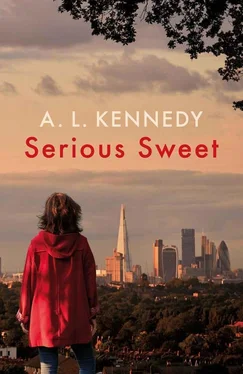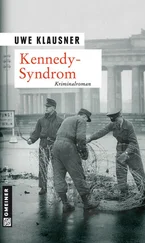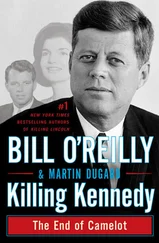Golden.
She had dialled the number listed for AA — despite feeling this would be an unhappy choice and irrelevant and wasting a stranger’s afternoon. She had spoken and cried and listened and spoken — mostly cried — and felt as a person does when that person is drowning and blazing and drowning and worn out with it.
Golden.
So that was March, then.
And she’d gone back to the AA meetings and had further strangers — and near strangers — walk across echoing rooms to tell her that she was welcome in what she felt was a semi-automatic way, but a semi-automatic welcome is still a welcome and maybe some of them meant it … They didn’t mean it, surely didn’t mean it, when she said how many sober days she’d collected, or when people would call out, when there were these scattered voices saying that she’d done well, or that complete strangers were glad she was there — that was just some kind of courtesy thing, that was like a reflex — but when people came up and made an effort and told her to her face they were glad to see her or glad to see her again — weird — glad to keep on seeing her … That seemed real in some way. And nobody patted either of her arms.
At first, though, she liked to assume that the warmth and concern apparently offered in the meetings was drawn from habit and not kindness. Habit felt safer than kindness. Meg didn’t want anything tender happening to her, because tenderness breeds tenderness and leaves you undefended.
They started to greet me by name and ask after details. How are you? That’s a detail.
AA is not exactly as advertised in that way — it isn’t exactly anonymous.
And it’s hard to agree that you’re alcoholic because that makes you feel a failure. Not the usual kind of failure — a drunk’s always a failure — it’s mainly you’d rather not know that everyone else in the alcoholic club allegedly can feel the same ways you feel and think the same ways you think, but they deal with it better and happier and drier. They deal with it dry.
This meant that I had a problem with both of the As in AA.
But there was tenderness.
You can’t avoid it.
They can’t avoid it.
And you get thankful.
It can’t be helped.
Apparently.
Allegedly.
You can be helped.
Apparently.
Allegedly.
And I spent a while clinging almost to that alone, so that I could stay sober.
Apparently.
Allegedly.
Those two golden As.
Apparently.
Allegedly.
Meg, newly sober and clean and starting again, once again, was less thankful and more in self-inflicted agony than anything.
They said the agony was self-inflicted. Sort of good news, because it means you can make it stop. Not good news, because you’re not to be trusted and will not do any such thing.
But she sat tight in the meeting rooms and in the echoes of ‘Hi, Meg.’ Stuck with the whole palaver, all the rest of the ways the not very anonymous alcoholics went about things: clapping and having to listen while other people talked and having to talk while other people listened.
Fucking purgatory.
She held on.
She counted days — clean days, dry days — and announced them to others who were also collecting days as if they were valuable, transferable, pleasant. She piled them one on top of the other, or imagined herself to be laying them down like the bricks of a wall that she wouldn’t climb back over again into razor blades and brown.
Having tried AA before and blown it she did expect to make that climb. She waited for the definitive shame of not even belonging with outcasts.
Only they didn’t seem that outcast.
And I didn’t fail.
I haven’t yet.
One year and counting and it feels all right.
She’d got fairly used to recognising the faces of what were almost friends. And they knew and she knew slightly, perhaps, what she was like and found that not distasteful.
All new to me.
There was this day when I laughed and noticed I was laughing and I couldn’t recall when I last did such a thing and someone who can’t laugh is in trouble and therefore I must have been.
And there was the day when Meg had walked through her own park, the Top Park, and seemingly she could watch the push of chlorophyll, the spring fire rising in a green blaze along branches. She’d seen the drift and scatter of white petals, blushed petals, mauve and pink and cream petals, and been struck, been beautifully punched in the heart, by the presence of everything. She’d kept on walking under surely the most blue on record, a sky which should have been commemorated ever after, a phenomenon of nature. The truth of beauty had given up more truth and then more beauty and then this serious sweet truth, this singing and wordless thing, alight, alight, alight.
Some kid in a school uniform went strolling through it, oblivious. He was having a fag and hands in his pockets, not looking.
That made me laugh, too.
And she had discovered herself kneeling at a certain point, folded forward on the turf and breathing out and in and this being an apparently endless and miraculous sensation.
It was all right to breathe. It produced no regrets.
The feeling passed, of course.
The world withdrew to a more bearable distance and made itself practical.
But that day left a memory which was wholly clean.
There was now an area inside her which was wholly clean — not just without liquids, without chemicals, substances — it was filled with being clean.
You could get sentimental about that.
And, of course, every rescued fucking horrible gerbil makes me think of saving and being saved and is wonderful in a way, at a level. Although it gets boring to cry so much, even with happiness. After a while, it’s no longer a treasure, or a sign of growth: you just want to skip it.
Her progress — if that was the name for it — had carried on: the work that let her be recovered — as if she was a knackered sofa — and by the end of April she didn’t seem so bad as she had been and was no longer shaking at all, neither when addressed directly, nor if asked a question. She could go into an unfamiliar shop without too much alarm.
Around her, London went brown in her place: Saharan dust pouncing in and making the breeze taste of broken tiles, of strangeness and thickened views. The screwed-up weather gave her headaches, but nothing like the headaches she’d had before. She could survey the city from above and pity it for being that little bit more afflicted than the Hill, the gentle Hill, the quiet Hill. And when she was out and walking — she did a lot of walking because it aided sleep — the buildings to either side of her had stopped leaning over and slyly bullying. She could call on the doctor — having got a new doctor — and visit the dentist — having got a new dentist — and have herself looked at and make appointments for what was overdue and begin to arrange what was left of her affairs. She noticed she was a financially screwed accountant — that wasn’t good, but she wasn’t homeless, was only being chased by civilised and shrinking threats. The worst threats were those that she built for herself in grey dawns, which was a trouble, but at least they were courteous and often left her alone once the sun was up.
Some things aren’t threats — they’re memories. It’s just that they feel like threats.
It took the police a while to reach me when Dad died. I pretended they believed that I was in shock, apparently intoxicated because of shock.
Читать дальше












